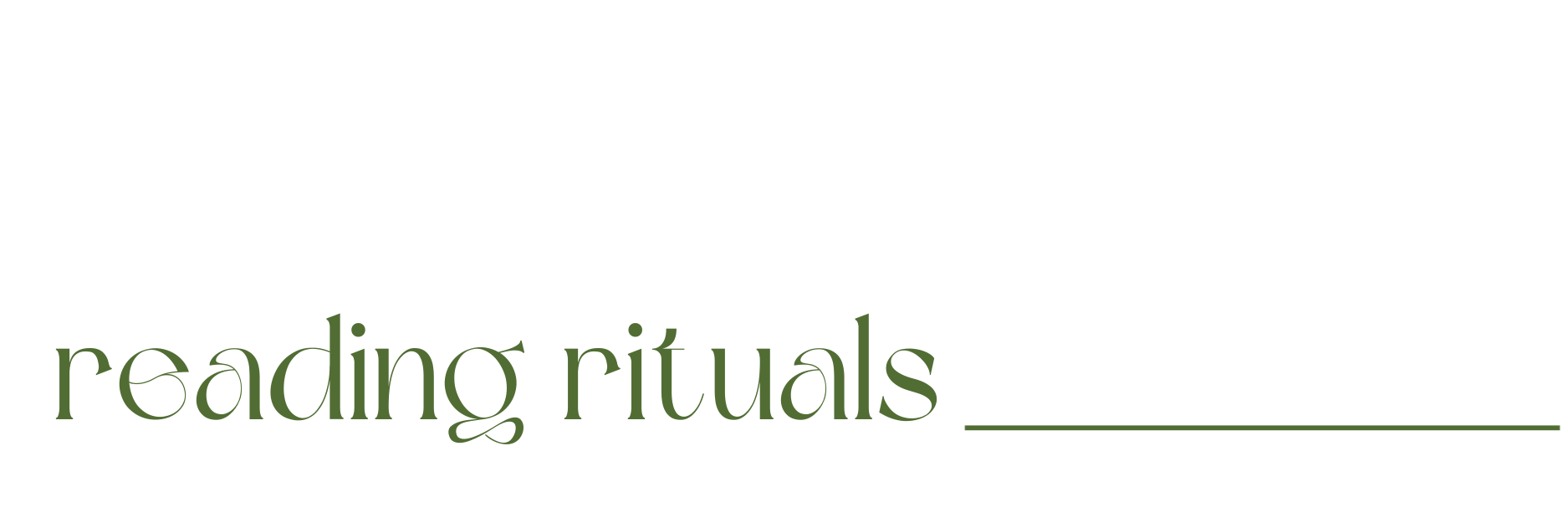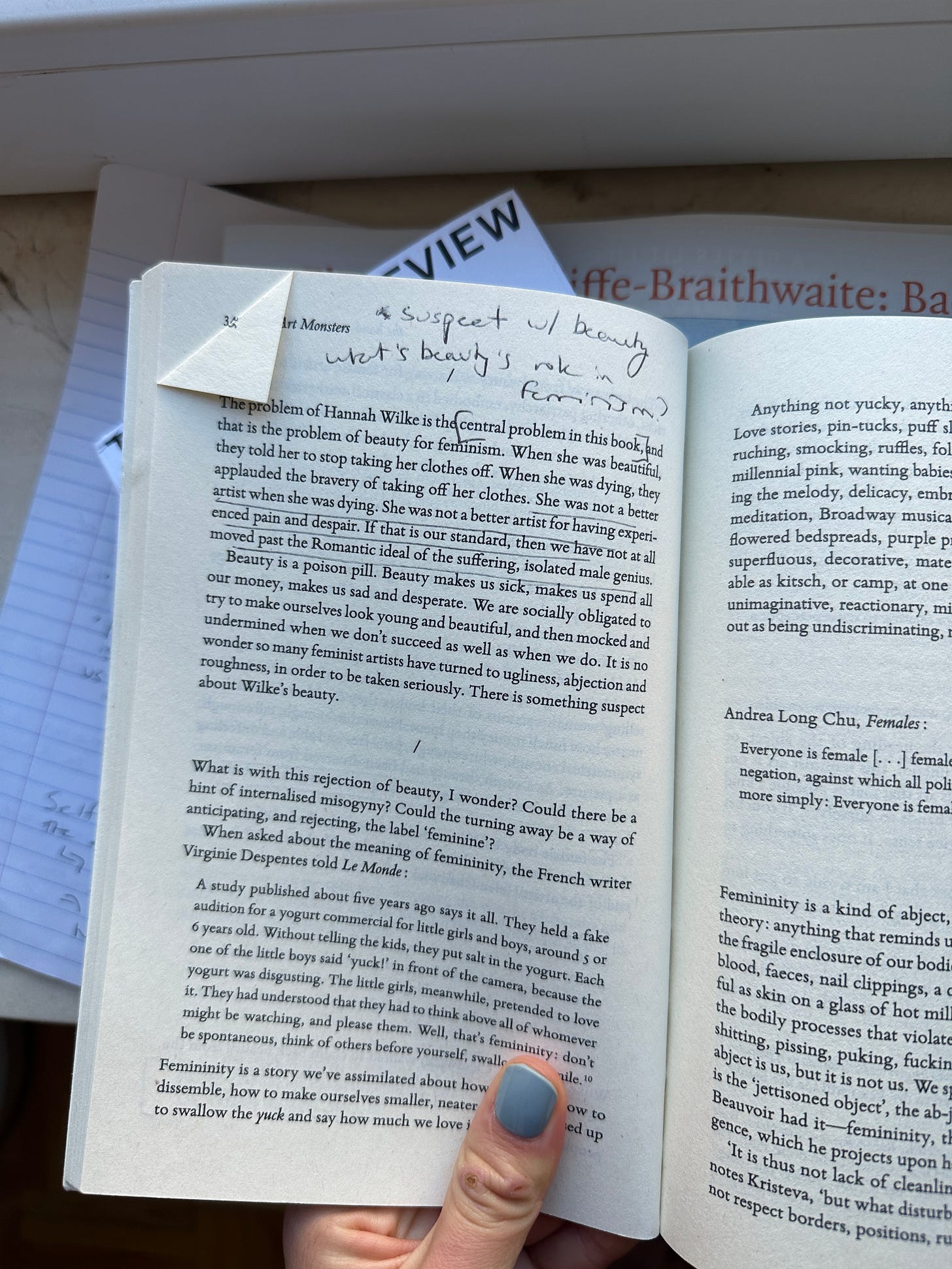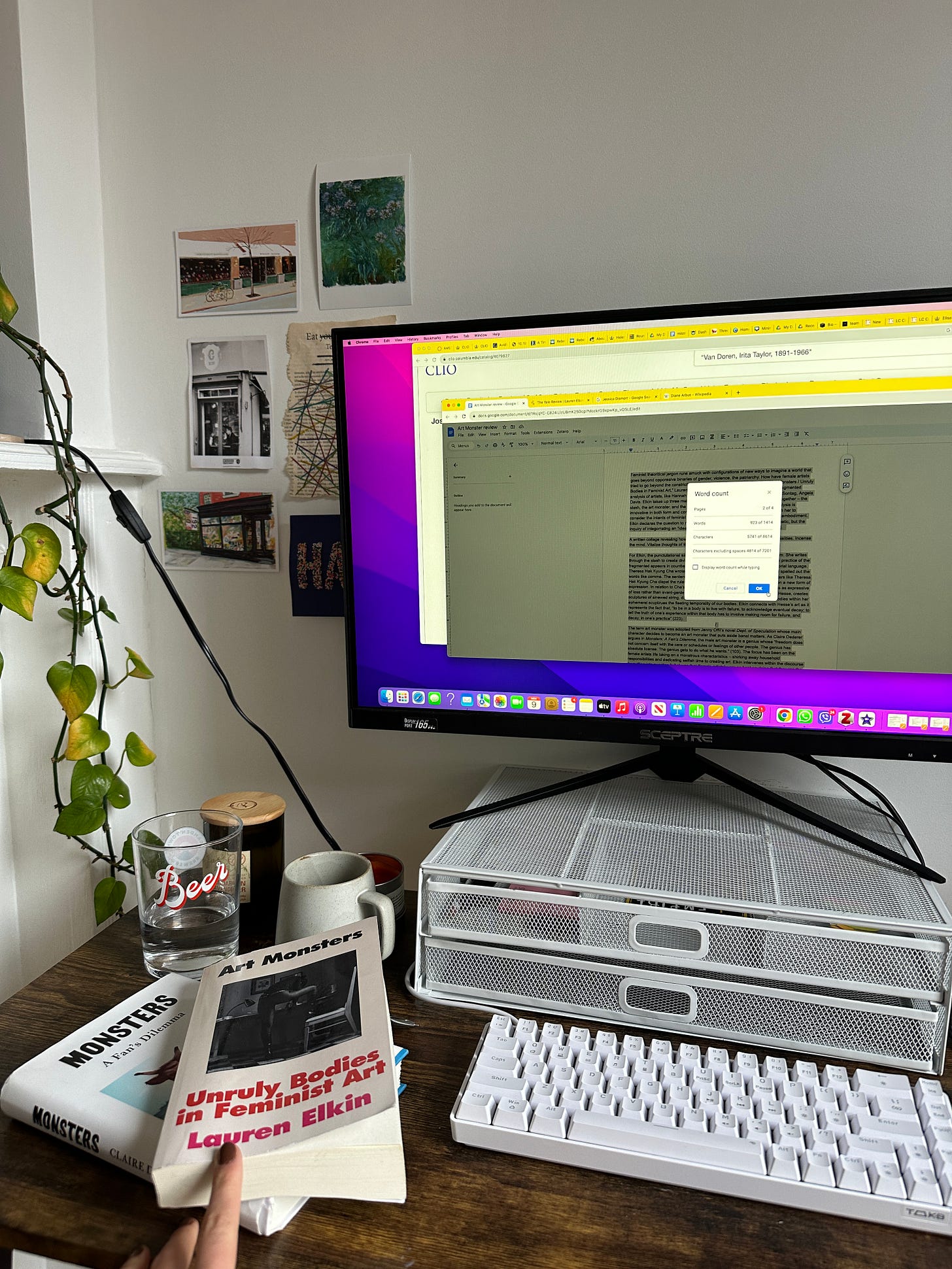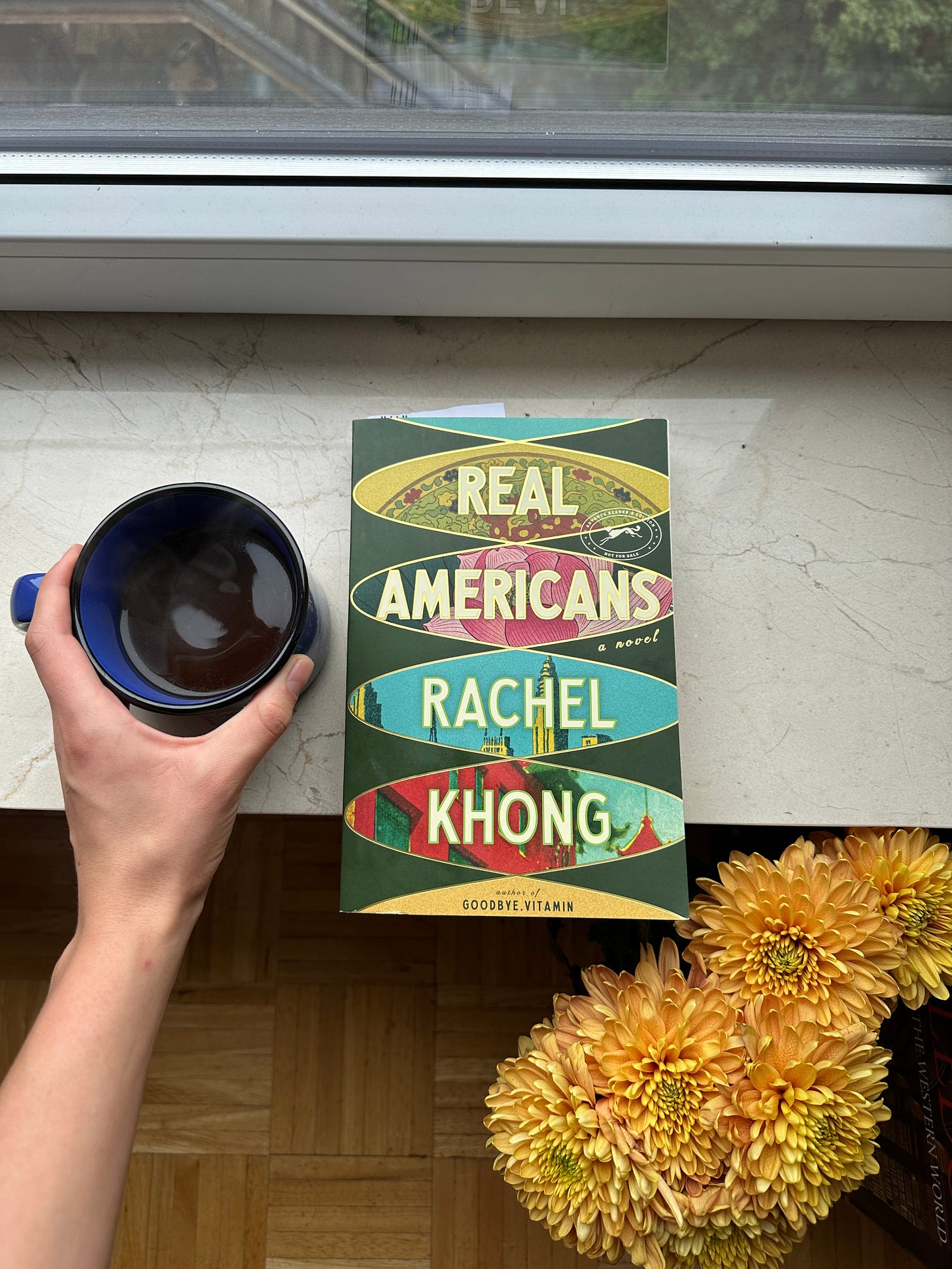Close Reader: An interview with Christina
on writing in your books, intellectual pursuits, and tinging every story with mystery
In this series, I ask some of my favorite Substack essayists, Bookstagrammers, and writers to share their reading and writing processes and habits, and tell us about the literary ideas they’re spending time with these days.
Today’s interview is with Christina Obolenskaya, from New York City, who I met on bookstagram and have been eagerly following as she began her graduate school adventure last fall.
What are you reading right now?
In normal times, the question evokes a mixture of excitement and certainty, as I can rattle off to you the title I am reading at any given moment. But in the past few months, I have started grad school and my whole reading routine has been thrown off kilter. In the past week, I read essays from Susan Sontag, excerpts from various female WWII journalists, a book about the gay liberation movement, and more I have already forgotten in the haze that is being back in school.
What are some of your favorite books or genres?
Creative nonfiction, memoir, first-person accounts from different time periods, diaries, letters, literary fiction, Carole Shields (she is a genre of her own), books by forgotten female authors (published by Persephone Books), translated literature, Fitzcaraldo Editions books.
What ideas are you studying or exploring right now?
My brain is splintered along two intellectual pursuits — creative and a more journalistic mindset. In the past year, I have been trying to pursue various fictional stories that carry throughout the character themes I am invested in exploring: the role of the genius and how that relates to women in the past, the political nature of literature, the limits of literature, untethered American identity, maturing beyond your early twenties, Ukrainian modes of resistance in both art and life, war reporting, feminist theory.
Finding a singular thread is quite hard, but I am trying to explore all of these questions in both my creative and nonfiction writing.
What is your reading method? Tell us about your reading routine, habits, quirks, anything you'd like to share.
I am a habitual morning reader. I find the hours between six and eight am when nothing else in the world is pressing within my schedule is the best time to read. I crawl out of bed, heat up some water for coffee, and sit down in my reading chair with a novel. The routine has been slightly offset as I now try to get some creative writing done in the morning instead, but overall I am a morning reader. I have tried to read at night and am disappointed to report back to you that I fall asleep no matter how interesting the book is.
What does closely reading mean to you? Do you consider yourself a close reader?
I consider myself an aspiring close reader (and this is an element of why I wanted to go to grad school). I am trying to cultivate better close reading habits by mulling texts over multiple times, coming back to passages, and sitting with them for a long time rather than jumping to conclusions. I have found writing as the best form of close reading. If I don't write to any degree about what I have read, you can count on me not having closely read the text.
Annotating is part of a close reading practice, but writing about a novel or essay is what helps me understand a text better. It is part of a reason to why I started a bookstagram and wrote about each book I read, as well as started reviewing books for various publications. One of my program advisors has been telling us all semester "writing is thinking" and I couldn't agree more with this statement. Writing is thinking, thinking is writing — you can't untangle the two apart.
“Annotating is part of a close reading practice, but writing about a novel or essay is what helps me understand a text better.”
Do you prefer to read hardbacks, paperbacks, or digital copies? Why?
I prefer paperbacks and will rip off the covers from all my hardcovers when reading them. I need to carry around my books in my coat pockets and bags and in hand, and the hardbacks are works of art but they are not easy to carry around. Thus, it is a very practical reasoning.
What’s your annotation process like, while you read? Do you write in your books? Why or why not?
I write in all of my books and think it is a disservice to leave a book blank! You have to interact with the art, write in the margins, fold down the pages! Although funnily enough I once worked as an assistant within a library's conservation unit of old archives and books and one of my main jobs was to smooth out folded pages. If I am not underlining and writing notes that means I am not engaging with the text. I don't write as much in novels as I read mostly for pleasure fictional stories, but my nonfiction reads on the other hand should be marked up if I read them well.
Speaking of writing, what is your current writing project?
I fear I have too many to list and am in a current phase where it feels like I need to stick to one. Earlier this year, I gave my first proper try at writing the beginnings of a novel that was about a philosophy student who discovered a female philosopher I became obsessed with, and exploring moral complexities around autonomy and reproduction throughout her life. I need to get back to this project next year and dedicate proper time to it if I want to be at any stage of being finished. In addition, I am now writing papers for grad school and still writing articles for various publications that accept my pitches for book reviews.
Describe your writing process. Where do you start? How do you get focused?
Writing needs to be the first thing I do in the day if I want to give it a solid try. I start with notes that I put on the document so that the page isn't blank and go to wherever my thoughts take me. I am not an outliner either in my fiction or nonfiction writing. I like to be surprised and discover new ideas as I write, rather than coming to the page with a preconceived notion of my ideas about a matter. Fiction writing is quite new to me and I found it challenging and daunting at first, as I had no idea how to construct dialogue or create characters out of thin air. I am still in the initial learning stages, but it has gotten easier with time and I no longer feel scared by the page.
“I like to be surprised and discover new ideas as I write, rather than coming to the page with a preconceived notion of my ideas about a matter.”
Describe your editing process. What’s that like? Do you self edit? Reach out to friends?
I need to get better about editing by printing out pages of my initial drafts, but I try to have a person or two look over my writing before submitting my work. In grad school, I have been lucky enough to be able to go to the writing center to have someone else look over my drafts before I submit a paper. Otherwise, if I am working on an article for publication I work with the editor to get it polished up before submission.
I need to get better at editing my work on my own though, as I know proper writing happens within the editing stage. I am very good at throwing everything in the kitchen sink and getting a lot of words down on the paper, but I need to hone my skills more within the editing stage of writing.
What’s your current coffee or tea order?
It changes, but my most consistent coffee preferences are black coffee or a cappuccino! I am a huge tea drinker, especially in the winter months, and recently found this tea from Tea Pigs that tastes like expensive cubes of apples and flowers and herbs and I can't stop drinking it.
Anything else you’d like to share about writing, reading, or annotating?
I have been lucky to be enrolled in a class with a New Yorker staff writer right now and the lessons I have learned in close reading and writing from him have been invaluable. I wish anyone could take his class, but will include some thoughts I have jotted down from our our classes.
“Everyone, real or invented, deserves the open destiny of life.”
— Grace Paley
Any story you tell needs to be laced with a tinge of the unknown. You can’t lay out your characters in such a manner that the reader knows from the start what will occur by the end of the story. By adding certain details to describe characters, you can’t expect readers to grasp why you included them, but the details can gesture the reader toward the direction you want the story to go. Any time you write down a detail, ask what is the value of this in the context of the larger story. Is it adding any further explanation of what may happen? As Gideon said, “details with ambiguous valance are necessary” within the story.
“Any story you tell needs to be laced with a tinge of the unknown.”
How do you represent a story with tension? Seize on moments with relevant differences between the two sides/people. If you have an unreliable character, you can represent their unreliability by including their contrasting opinions in separate parts of the story, letting the reader come to their own conclusions on who is the reliable narrator.
Lastly, for those who want to get to know you better, where can they find your work? Share your @ for anyone who wants to follow along!
I share my book content both on Instagram (@oboreads) and Youtube (@christinaobo)! My writing links can be found on my website.
Come chat with me about your books and writing ideas!
Christina, thank you so much for joining this series and sharing your thoughts on reading, writing, and storytelling with us.
For more interviews and weekly close readings, subscribe now.











This was a great interview! It was kind of justifying for me as I, too, am a "crack of dawn" reader (I wake up at 5 AM every day so I can read for two hours before leaving for work). I wonder how many others feel the need to do it first thing in the morning. It's like a meditation for me.
Loved this interview! Christina's reading interests align very much with my own. Also this: "Writing is thinking, thinking in writing". Thank you for sharing that 😀